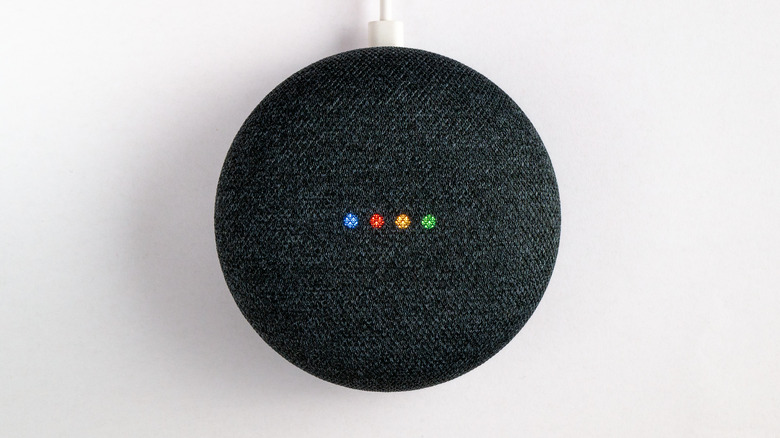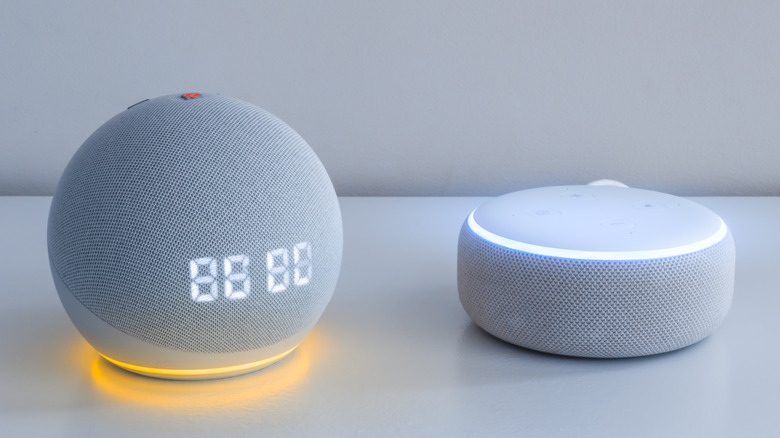The End Of The Road For Alexa And Siri? Here's Why Some Experts Say AI Will Make Them Obsolete
Alexa, Siri, and other voice-activated assistant tools are headed for a unique challenge in the coming months and years. With the continued development of chatbots grabbing headlines and showcasing a plethora of fantastic capabilities, current AI tools may be headed for rapid obsolescence. AI tools are now capable of creating award-winning pieces of art or potentially serving as augmentation within highly technical career fields.
Earlier tools, like Alexa and Siri, are built on an AI framework, too. However, they specifically operate in a very different and very diminished capacity.
Newer tools, like Augment's AI assistant are instead built for the future. Augment launched a beta rollout in September 2022, and Fast Company's JR Raphael notes that the brand's mission is to build an AI that "works proactively on our behalves and helps us out in some genuinely meaningful ways." One target function is in keeping track of meetings and pulling up relevant details that may help a presenter keep track of their recorded thoughts across various applications.
Proactive and generative AI systems appear poised to make a huge splash in the typical workflow of a company, but they may also massively impact the way we perform other daily tasks beyond the office setting. This may be a potential death knell for older assistant tools, but this comes through more than just the advent of newer, better technology. In many ways, the creators of voice command systems did this to themselves.
Command-and-control systems versus language model AI
The thing that separates tools like Siri and Alexa devices from AI chatbots lies in the respective infrastructure.
Voice assistants are built as "command-and-control systems," meaning they are programmed to understand commands and produce a desired response. If you say, "What's the weather like today?" The tool searches its database to identify what you're asking, and offers up a brief forecast. I asked my own Alexa-enabled device a series of additional, related queries, including: "Is it nice; what's it like today; how's it out?"
Alexa was able to provide weather updates for all three, even though my phrasing was intentionally obtuse. However, my first awkward ask elicited a weather blurb from a local news outlet nowhere near my location. What's notable about all of these prompts is that the device answered in basically the same format.
Chatbots, on the other hand, are trained using large-scale language models and generate unique, human-like responses. They aren't shackled by the same constraints that keep voice assistant tools deficient at responding with relevant information consistently. As well, chatbots are far less likely to deliver four simultaneous answers that all read as copies of one another.
Voice assistants are trained to recognize a predetermined database of questions. For Siri in particular, The New York Times reports that it could take up to six weeks to simply add new phrases to the list as a result of the myriad languages supported, and the complexity of the master list itself — creating "one big snowball," according to former Apple engineer John Burkey.
Google, Amazon, and others misinterpreted the market for these tools
While it wouldn't be a stretch to note the nature of technology advancing with time, this isn't the only factor at play. There's actually another very good reason for this divide in functionality between newer chatbots and older voice assistant devices. Google and Amazon in particular built smart home devices that they envisioned would become integral in their owners' daily lives.
Amazon's initial push into the voice assistant space was built on a perceived value in placing an order through conversation with the Echo device and controlling a variety of connected features. Yet, this behavior simply didn't catch fire, and voice assistant owners instead have largely used these tools to play music, interact with connected hardware in their homes (like lightbulbs), or activate timers.
Contrasted with the over 28,000 smart home devices that an Alexa device can interact with (per Wired), it's clear users haven't adopted their voice assistant tools in the way that designers anticipated.
Developers anticipated a means of generating significant potential revenue through the voice tools (Google even worked to place ads in their lineup of smart home gadgets) that never truly served their full purpose. The result has been a lagging focus on building out user enhancements that might make current generation smart devices more versatile. Ultimately, the missed mark here results in one final conclusion that accounts for existing assistant technologies' lagging place in relation to chatbots.
Update 3/27/2023: Amazon has reached out to SlashGear with a response to this article, saying, "Globally, Alexa engagement increased more than 30% in 2022. Customers engaged with Alexa Skills tens of billions of times over the past year, and Alexa engagement through Skills grew more than 35% over the past year. There are more than 300 million smart home devices connected to Alexa. And, customers interact with Alexa billions of times each week."
Virtual assistants haven't been maintained for user efficiency and rich utilization
Tristan Greene writes for The Next Web, noting that "virtual assistants were supposed to evolve over time. Yet all we've seen in the past five years is fine-tuning and tweaks."
Across the board, from Google, to Samsung, Amazon, and Apple, AI-powered voice assistants have become gradually more responsive, while also providing incorrect or irrelevant information. Greene notes that these companies haven't been focusing their attention on rounding out robust features that can make the devices more useful — like the largely poor quality library of "skills" that Amazon's devices can incorporate.
Indeed, a report from Lauren Silverman at NPR points out that after a person downloads a skill, "there's only a 3% chance they'll open it again after the first week." Instead of pushing for better user experiences, development has focused almost exclusively on honing these devices as data collection points, feeding information back to the server to make the company's own processes more efficient and profitable. If that effect helps consumers, it's a net positive for everyone, but this isn't the primary goal, Greene concludes.
Plugins and crossover utility have become central to the mission of ChatGPT and other next-generation AI tools. ChatGPT is finding relevancy as a Google Sheets addition known as Numerous.ai, and OpenAI has also contributed to DuckDuckGo's efforts to add an AI summarization tool to its privacy browser. Advocating for a new direction, Greene supposes that an offline AI system would be a far more useful tool for end users. ChatGPT, thus far, happens to remain a non-connected language model system that offers just that.



